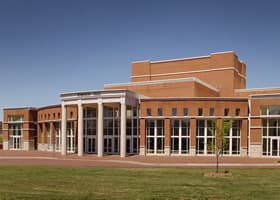
Robinson Hall for the Performing Arts is a state-of-the-art venue that affords the campus and the community access to a slate of contemporary and classical dance, music and theater offerings.
Named for Russell and Sally Dalton Robinson, the three-story, 118,000-square-foot facility contains classrooms, offices and performance and rehearsal spaces for the departments of dance, music and theatre. It was built and equipped for $28 million, financed through the statewide bond referendum approved by voters in 2000.
The hall’s first floor houses a 332-seat proscenium theater, which includes a 23-seat orchestra pit. The theatre has a 3,500-square-foot stage equipped with 18 trapdoors, a curtain 26 feet high and a 60-foot fly-loft for storing and changing scenery. There also is the Black Box Theatre. Throughout the building are rehearsal rooms and labs for costume, scenery and lighting design.
 The Robinsons are both Charlotte natives, and they are considered among the most admired and effective community leaders. In addition to leadership roles at Christ Episcopal Church, they have supported professional, educational and charitable institutions, arts and cultural organizations and economic development services.
The Robinsons are both Charlotte natives, and they are considered among the most admired and effective community leaders. In addition to leadership roles at Christ Episcopal Church, they have supported professional, educational and charitable institutions, arts and cultural organizations and economic development services.
Russell Robinson II is founding partner of one of North Carolina’s largest law firms - Robinson, Bradshaw and Hinson. According to an article in the Charlotte Observer, Robinson majored in English at Princeton University but transferred to Duke University after two years. He went on to obtain his law degree from Duke in 1956. His firm has represented numerous businesses and organizations, including Belk Store Services Inc., the Duke Endowment, Duke Power and the Charlotte Housing Authority. His book “Robinson on North Carolina Corporation Law” is considered a necessity for any aspiring Tar Heel corporate lawyer.
A member of the UNC Charlotte Board of Trustees from 1987-97, Robinson served as chair for eight years. During his board tenure, Robinson was regarded by observers as a “quiet power” for the University; he focused on increasing public and private funding and obtaining UNC system authorization for doctoral degrees beyond joint Ph.D. programs.
In addition to his role as a trustee, Robinson was a director of the UNC Charlotte Foundation. He also has been a trustee of the Duke Endowment and chair of Duke University’s Board of Trustees.
Sally Dalton Robinson attended public schools in Charlotte, St. Mary’s School in Raleigh and Duke University. She was a member of Phi Beta Kappa and earned a bachelor’s degree in history. Among her many civic contributions, she served as an integral founding member of the Levine Museum of the New South and the St. Francis Jobs Program (now the BRIDGE Jobs Program). She also was on the board of the Charlotte Symphony, the Arts and Science Council, McColl Center for the Visual Arts as well as other religious, charitable and economic organizations.
Dedicated Nov. 3, 2004, Robinson Hall was designed by the Charlotte architectural firm of Jenkins Peer. Skanska and R.J. Leeper were general contractors, while the firm Biemann and Rowell was the mechanical contractor. Port City Electric served as the electrical contractor; the hall’s lighting and acoustical controls were among the most sophisticated in modern theater design at the time of construction.
Atkins Library Special Collections contributed to this article.